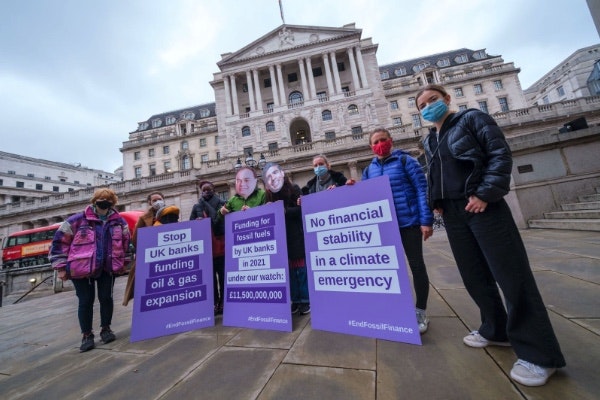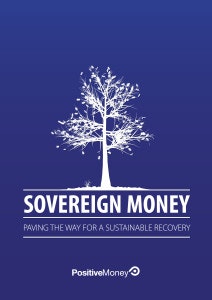Sovereign Money Creation: Paving the Way for a Sustainable Recovery


By fuelling our economy through ever-rising levels of household debt, we are repeating the mistakes that led to the 2007-08 financial crisis. Ever since that crisis, the Government and Bank of England have tried to encourage further consumer borrowing via further lending by banks. As former FSA chairman Lord Turner put it, this was a “hair of the dog” strategy for economic recovery, treating the cause of the financial crisis – excessive borrowing – as though it could also be the solution. However, household debt can only grow faster than salaries for so long before the weight of the debt becomes excessive. With household debt already close to its highest level in history, and set to rise further as a result of Government policy and easier lending by banks, we believe the current economic recovery is unsustainable. Just as the economy is running on borrowed money, the recovery is running on borrowed time.
There is therefore a need for an alternative strategy for a more sustainable economic recovery. This paper proposes this alternative, a new solution called Sovereign Money Creation (SMC). SMC offers a way to make the recovery sustainable. In a similar way to Quantitative Easing, SMC relies on the state creating money and putting this money into the economy. But whereas QE relied on flooding financial markets and hoping that some of this money would ‘trickle down’ to the real economy, SMC works by injecting new money directly into the real economy, via government spending, tax cuts or rebates.
Our analysis shows that by getting spending power directly into the hands of the public, this new solution could be up to 37 times more effective than Quantitative Easing in boosting GDP.
The pivotal advantage of SMC is that unlike the Government’s current growth strategies – which all rely on an over-indebted household sector going even further into debt – SMC requires no increase in either household debt or Government debt. In fact, SMC can actually reduce the overall levels of household debt. It would also make banks more liquid and the economy fundamentally safer.
Similar ideas have recently been proposed by Lord Adair Turner, under the name Overt Money Finance. The March 2013 budget included a review of the monetary policy framework, which expressly permitted the Bank of England to use ‘unconventional policy instruments’ to support the government’s objectives for growth and employment, meaning that SMC could be used within the current operating framework.
The creation of money by the state often leads to concerns about inflation, but there is no reason why it should be more inflationary than the creation of money by bank lending (which typically creates inflation in the housing market). In addition, whereas most money created via bank lending goes into the property market, the money created via Sovereign Money Creation would go directly into the real economy, boosting GDP and employment. By boosting the capacity of the economy, SMC should actually be less inflationary than consumer lending, and the use of SMC can be restricted should it start to be inflationary. We believe that ultimately, it is a matter of when, not if, this policy will need to be implemented for the long-term sustainability of UK economic growth.
PDF Download:
Download Here (Free, PDF, 60 pages)
In 2 Minutes:
There are currently two sources of money into the UK economy:
Money created by banks, when they make loans. This currently makes up the majority of money in the economy.
Money created by the Bank of England on behalf of the government. Currently this makes up a tiny percentage of the money in the economy.
The problem we currently have is that the government isn’t willing to use its power to create money in the public interest. Instead, it relies on the same banks that caused the financial crisis to create money. But most of the money created by banks goes into house price bubbles (40% of all new money created in the 10 years running up to the financial crisis) and financial markets (37%), whereas only a minority (13%) ends up in the real economy.
So right now, we see banks still reducing their lending to businesses, whilst increasing their lending for mortgages. If household debt is rising, but businesses aren’t able to increase salaries, then sooner or later, some of the debt becomes unpayable and people will default.
The government’s strategy for getting the economy growing again could actually lead us back into another financial crisis. In Sovereign Money: Paving the Way for a Sustainable Recovery, we’ve outlined the reasons why the government is making a dangerous mistake by relying on further bank lending to boost spending and help the economy grow. We explain how a process called Sovereign Money Creation (SMC), which involves allowing the Bank of England to create money, which would be granted to the government and spent into the real (non-financial) economy, would boost spending and employment but without requiring households to borrow even more.
Rather than increasing the total amount of debt in the economy, SMC actually lowers it. It would make the current ‘recovery’ into a sustainable one, rather than one fuelled by credit cards and mortgage lending. Importantly, the creation of sovereign money through SMC can be done without having to stop banks creating money, so it’s something the government and Bank of England could do right now without having to face the counter-lobbying and political battle of trying to remove subsidies and privileges from the banking sector.